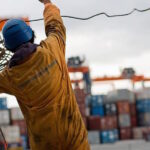Energy News Beat
Steven Jones, the founder of the Seafarers Happiness Index, reflects on the frustration about the treatment of seafarers in many ports around the world.
When thinking about seafarers’ happiness, it is tempting to assume their greatest challenges occur far out at sea. However, new insights reveal a different story—seafarers are increasingly speaking out about the troubling treatment they face in ports worldwide.
Ports, the very places meant to offer safe haven, respite and support, are becoming sites of frustration and mistreatment. Issues like abandonment often arise when vessels dock, but smaller indignities accumulate too, creating an environment of tension and needless neglect that takes a heavy toll on seafarers’ morale and well-being.
The latest Seafarers Happiness Index highlights some of the worst experiences, painting an unflattering picture of certain ports. Crews report unwelcoming, even hostile environments, with access to shore leave denied, poor treatment, and essential support systems failing when needed most. Frustration is mounting, as seafarers deal with a mix of petty bureaucracy, ineffective systems, and policies that make life unnecessarily difficult.
One recurring issue is the maddening inefficiency of “port buses” that either fail to turn up or operate on schedules more hopeful than reliable. Seafarers are left waiting endlessly, their much-needed shore leave disrupted by unreliable transport. This inconvenience, which is exacerbated by port gates deliberately kept closed to seafarers, adds to the feeling that their needs are unimportant. Instead of granting easy access to nearby towns, ports often force crews to enter or exit through remote gates, far from civilisation—wasting time, adding costs, and sending a clear message about their value.
Worse still, this lack of support is frequently accompanied by rude, arrogant, and offensive behaviour from port personnel. Seafarers have voiced concern about the sheer disrespect they face at the hands of gate staff. While security is necessary, there is no excuse for the aggression, rudeness, and hostility that some crews encounter, especially when these ports should be places of welcome and assistance.
It is deeply troubling when port authorities, who we might suppose want to help (or at least not hinder seafarers), end up making matters worse. There seems to be a significant disconnect between some ports and the needs of one of their most important stakeholders: seafarers.
A closer look at the Environmental, Social, and Governance (ESG) reports of many port operators may hint at the problem. Page after glossy page of graphs, imagery, and lofty commitments, yet rarely is there even a mention of seafarers.
This omission has become the norm. Port’s’ “social” priorities appear to have a seafarer-shaped blind spot. When reporting on stakeholders, seafarers are often overlooked, seemingly considered unimportant to the operation of ports. This disregard seemingly legitimising, certainly explaining, the poor treatment they so frequently receive.
It is not always the port itself that is leading the negative spiral. Often it can be the decisions of customs and immigration authorities. So, we would ask whether ports are doing enough to push back, to explain the problems and to champion crews and to stand up for them? Again, it would seem probably not.
Port personnel—whether on the gates or in the boardrooms—need to take a hard look at how their operations affect seafarers. Some honest self-assessment is needed. Port authorities should take the time to truly experience how their own port functions. Is the gate closest to town unnecessarily closed? Try taking the port bus—observe how sparse the information on schedules is, how dirty the seats are, and how unhelpful the staff may be.
Consider how it feels to be required to wear full PPE just to visit the local shops. What’s the experience like at the gate? How are seafarers treated? Only by stepping into their shoes can we truly understand the challenges they face—and only then can we determine if we are doing enough to make them feel welcomed, valued, and respected.
Until seafarers are recognised as key stakeholders and important port users then it seems problems will persist. The message is clear that ports need to modify their operations to ensure that crews can easily, safely, and respectfully access the services they need. Until that happens, the industry faces a significant, self-inflicted problem, and that is a very depressing reality.
The post Seafarers’ struggles in global ports appeared first on Energy News Beat.









